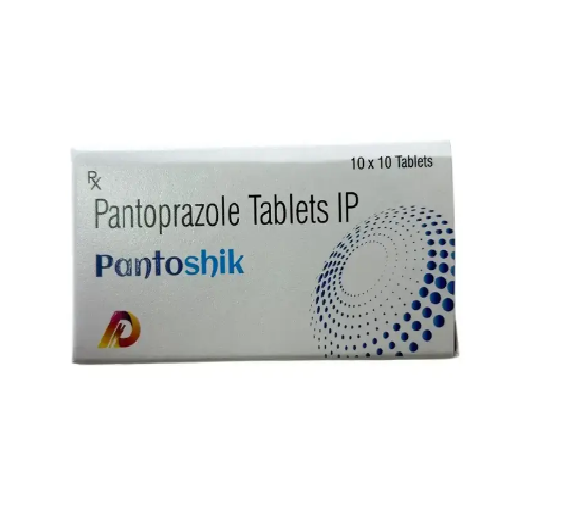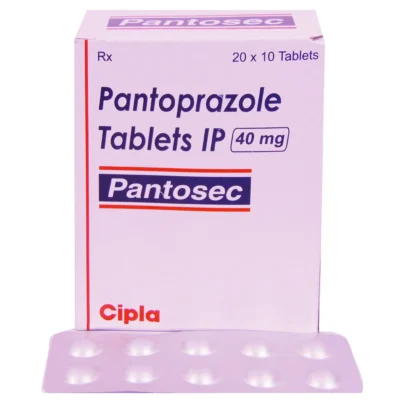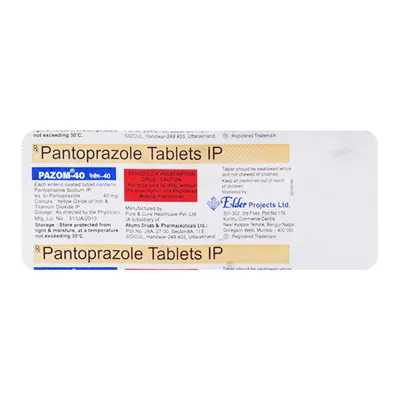🔥💊🛡️ Pantoprazole 40mg Tablet: Powerful Acid Suppressor for Lasting Digestive Relief
Pantoprazole 40mg is a widely used proton pump inhibitor (PPI) that effectively reduces excess stomach acid production. It is commonly prescribed to treat acid-related gastrointestinal (GI) disorders such as gastric and duodenal ulcers, gastroesophageal reflux disease (GERD), erosive esophagitis, and Zollinger-Ellison syndrome. By inhibiting the final step in gastric acid secretion, Pantoprazole provides long-lasting relief from heartburn, acidity, and ulcer-related symptoms.
🔬 Mechanism of Action
Pantoprazole belongs to the PPI class and works by:
-
Irreversibly binding to the H+/K+ ATPase enzyme (proton pump) in the stomach lining
-
Blocking the final step of acid production in gastric parietal cells
-
Reducing both basal and stimulated acid secretion
This action helps to heal acid-induced damage, relieve pain, and prevent complications like bleeding ulcers or esophageal strictures.
📌 Indications and Uses
Pantoprazole 40mg is used for:
🔹 Treatment:
-
GERD (Gastroesophageal Reflux Disease) – relieves acid reflux, regurgitation, and heartburn
-
Erosive esophagitis – healing and maintenance
-
Peptic ulcers – stomach and duodenal ulcers, especially when associated with H. pylori
-
Zollinger-Ellison syndrome – a rare condition of excessive acid production
-
NSAID-induced gastric protection
🔹 Prevention:
-
Stress ulcers in hospitalized patients
-
Acid aspiration risk during anesthesia (off-label use)
💊 Dosage and Administration
-
Usual adult dose: 40mg once daily, preferably before breakfast
-
For GERD and ulcers: 4 to 8 weeks of therapy is typical
-
Maintenance dose may be continued at 20–40mg once daily
-
In Zollinger-Ellison syndrome: higher doses (up to 120mg/day) may be needed under specialist care
Swallow tablet whole with water—do not crush or chew. Consistent timing enhances effectiveness.
⚠️ Precautions and Warnings
-
Long-term use may lead to:
-
Vitamin B12 deficiency
-
Magnesium deficiency
-
Bone fractures (hip, wrist, spine) in older adults
-
Increased risk of Clostridium difficile infection
-
-
Use with caution in:
-
Liver impairment
-
Osteoporosis
-
-
Safe during pregnancy (Category B); consult doctor for breastfeeding
Discontinue only on medical advice, as sudden withdrawal can cause acid rebound.
🤒 Side Effects
Common:
-
Headache
-
Diarrhea
-
Nausea
-
Flatulence
-
Abdominal pain
Rare/Serious:
-
Hypomagnesemia (muscle cramps, arrhythmia)
-
Severe allergic reactions
-
Liver enzyme elevations
-
Kidney inflammation (interstitial nephritis)
Seek medical help for persistent diarrhea, rash, muscle weakness, or breathing issues.
🔄 Drug Interactions
Pantoprazole may reduce the absorption of drugs that require an acidic environment, such as:
-
Ketoconazole, itraconazole
-
Iron supplements
-
Atazanavir (HIV drug – avoid use)
-
May interact with warfarin, methotrexate, and clopidogrel
Always inform your doctor of all medications being taken.
🧊 Storage Instructions
-
Store at 15–30°C
-
Keep in a cool, dry place, protected from moisture and light
-
Keep out of reach of children
📝 Conclusion
Pantoprazole 40mg is a highly effective, long-acting acid suppressant that provides relief from a wide range of acid-related GI disorders. With once-daily dosing and a strong safety record, it is trusted for the treatment, healing, and prevention of GERD, ulcers, and esophagitis. When used under medical supervision, it offers safe, sustained digestive protection and comfort.
Note: This information is intended for educational purposes and should not replace professional medical advice. Always consult a healthcare provider for personalized guidance.





Reviews
There are no reviews yet.